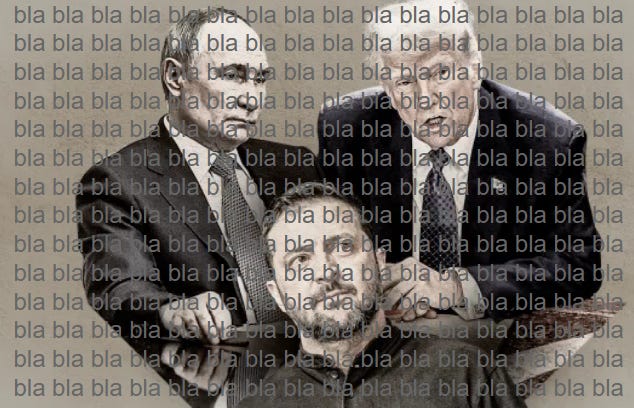All Quiet on the Eastern Front
Diplomacy is intense. But nothing is actually happening. We are no closer to a ceasefire or peace.
Total confusion dominates the diplomatic landscape surrounding the war in Ukraine, with frequent shifts in positions and ambiguous signals from Russia, Ukraine, the USA, and Europe. This has led many to question whether a ceasefire is imminent, what actions former President Trump might take, and what demands Putin is making. The confusion is understandable-the situation appears chaotic. Yet, stepping back reveals a clearer pattern.
A common misconception is that Russia holds the key to ending the war. While, in theory, the Kremlin could stop the conflict by withdrawing from Ukraine, in practice, Russia has remained consistent: it does not want peace or a ceasefire at this stage. Moscow has not achieved its strategic objectives and fears the political and social fallout of ending the war prematurely.
Russia’s demands for any peace agreement remain extensive - requiring international recognition of occupied territories and sweeping changes to Ukrainian policy - amounting to an ultimatum rather than genuine diplomacy. Ukraine, for its part, has made clear it will not capitulate.
In recent months, European and Ukrainian diplomacy have managed to keep the United States partially engaged, for example through agreements on minerals. Europe’s primary objective is to maintain U.S. involvement for as long as possible to buy time for rearmament. Despite uncertainty over Trump’s future policy, European leaders are preparing for a diminished American role. Three scenarios are possible:
The U.S. withdraws abruptly, ending all support, intelligence sharing, and lifting sanctions. This now appears the least likely.
The U.S. withdraws gradually, halting military aid but maintaining intelligence sharing and sanctions. This is currently the most probable scenario.
Trump reverses course, increases support, and puts real pressure on Russia. Given Trump’s longstanding skepticism toward Ukraine, Europe, and democratic values, this appears unlikely.
The key point:
The ball is not in Russia's court. We know they want war. There will be no ceasefire. Putin will not come to Istanbul.
The responsibility now rests with Europe. While European leaders continue to engage with Trump to prolong U.S. support, they must ultimately take the lead themselves. This requires a united European stance: “We will win the war, together with Ukraine.” So far, only German Chancellor Merz has demonstrated this level of resolve. The question remains whether others will follow.
In summary:
Diplomatic activity is intense, but substantive progress toward peace in Ukraine remains elusive. Russia is committed to continuing the war, the U.S. is wavering, and Europe is striving to maintain support.
Ultimately, this is a conflict that Ukraine and Europe must face together, as Russia continues to pursue its imperial ambitions with little regard for international norms or justice.


